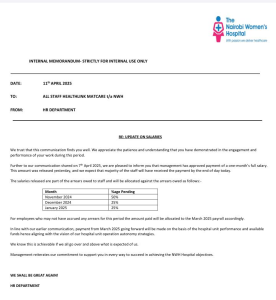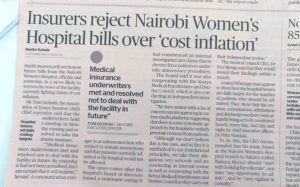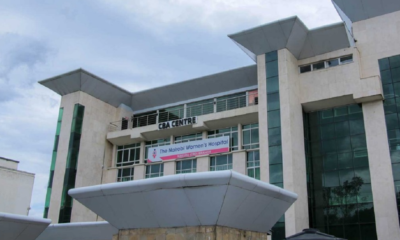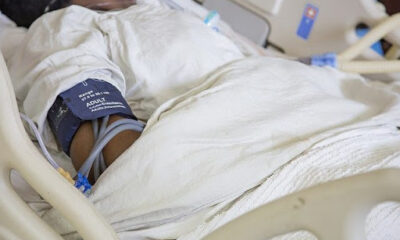Investigations
Life and Death For Profit – The Scandal Inside Nairobi Women’s Hospital
At the heart of the controversy is a directive from hospital management that ties staff salaries directly to how many patients are admitted and how long they remain in the ward—regardless of medical necessity.
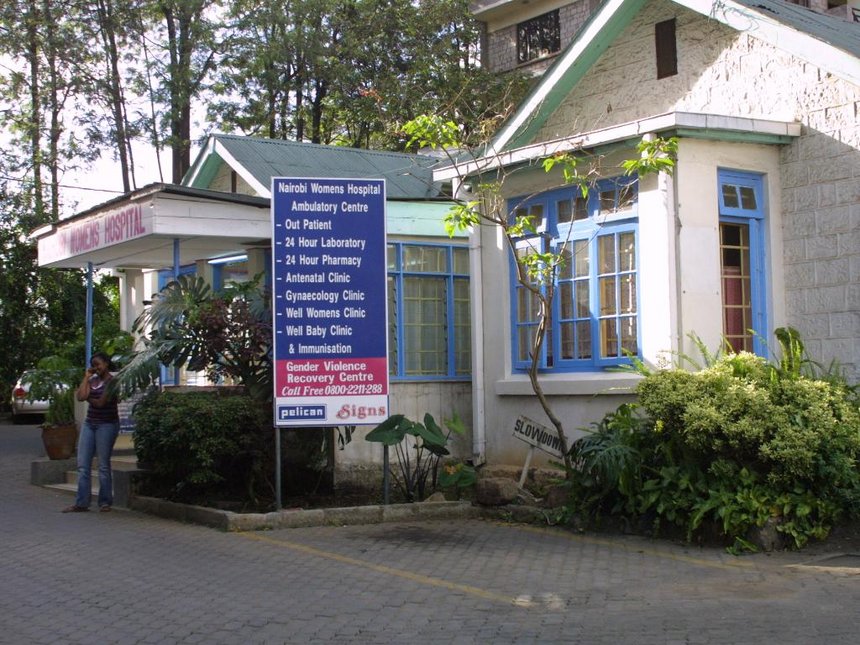
A whistleblower has exposed alarming practices at one of Kenya’s most trusted healthcare institutions, where patient admissions are allegedly being driven by profit rather than medical necessity—with deadly consequences.
Medical Ethics Compromised by Financial Targets
The Nairobi Women’s Hospital, once respected for its specialized care for women and children, is now at the center of a disturbing scandal involving allegations of forced admissions, manipulated hospital stays, and a payment system that incentivizes quantity over quality of care, according to a current staff member who requested anonymity for fear of retaliation.
At the heart of the controversy is a directive from hospital management that ties staff salaries directly to how many patients are admitted and how long they remain in the ward—regardless of medical necessity.
“The hospital has essentially created a commission-based system for healthcare,” our source revealed. “Doctors receive only Sh1,500 upon each admission, creating pressure to admit as many patients as possible rather than providing thorough care.”
Fatal Consequences
The most disturbing allegation involves the recent death of a child at one of the hospital’s Nairobi branches—reportedly a direct result of the facility’s admission policies.
According to our source, the child died while staff followed the hospital manager’s instructions to keep the patient admitted for continued billing, despite deteriorating conditions that may have required more specialized intervention.
“This inhumane treatment is tantamount to criminal behavior,” said our source. “Worse still, the grieving family has been denied access to the truth in what appears to be a complete cover-up.”
Non-Clinical Staff Pressured to Drive Admissions
The pressure to fill beds extends beyond medical personnel to administrative staff who have no clinical training or patient contact.
These employees, whose roles have nothing to do with medical decision-making, are nonetheless evaluated and compensated based on admission rates.
“This creates a dangerous environment where even receptionists and administrative assistants feel compelled to encourage unnecessary admissions,” the whistleblower explained.
“The responsibility for growing patient numbers should fall under the manager’s marketing role, not on clinical staff whose primary duty is patient care.”
Caesarean Deliveries at 99%
Perhaps most alarming for an institution that specializes in women’s health is the claim that 99% of deliveries are now performed by Caesarean section—an extraordinarily high rate that far exceeds what would be medically necessary.
For comparison, the World Health Organization recommends that C-section rates should ideally not exceed 10-15% of births.
“Mothers are kept for five days before being billed Sh24,000 for what should be a 24-hour stay,” our source claimed.
“This is a clear case of exploiting vulnerable women during what should be one of the most precious moments of their lives.”
Arbitrary Salary Disparities
The whistleblower also detailed troubling inconsistencies in how staff are compensated:
“Nurse Oluoch receives just 25% of his salary while Nurse Karanja receives 100% for the same month, in the same facility and department,” they revealed.
“When Dr. Thenyia called for a full audit of payroll, these discrepancies remained unaddressed.”
According to our source, the Human Resources department, led by a consultant described as “manipulative despite her seemingly approachable demeanor,” has been complicit in maintaining these disparities, creating an atmosphere of favoritism rather than merit-based evaluation.
Fear and Silence Among Medical Staff
The whistleblower described a working environment dominated by fear, where raising concerns about patient care or ethical violations results in retribution rather than reform.
“Staff members are fearful, demoralized, and silenced,” they said.
“This is not the environment where quality healthcare can thrive. Patients deserve better, and so do the dedicated professionals who want to provide proper care.”
Leadership Undermining the Hospital’s Mission
Our source indicated that Dr. Thenyia, apparently a senior figure at the hospital, “had a vision” for the institution that is being actively undermined by current leadership.
“The board members are very astute,” the whistleblower noted, “yet it is crucial to bring about change in this leadership for the betterment of both staff and patients.”
This is not the first time Kenyan private hospitals have faced scrutiny for financially motivated admission practices.
In 2020, an exposé on the hospital group revealed similar policies, resulting in regulatory intervention.
The hospital had been in the limelight following claims that its doctors forced patients to undertake unnecessary procedures.
A leaked Whatsapp conversation revealed alleged ‘strategies’ that the facility used to meet their revenue targets.
Among the claims is that doctors allegedly admitted patients who do not necessarily require to be admitted and delayed discharging patients unnecessarily to allow more time to meet the targets.
Private health insurers suspended services with Nairobi Women’s Hospital on February 5, following allegations of cost inflation at the facility.
The Kenya Revenue Authority (KRA) has suspended Nairobi Women’s Hospital from its list of approved medical care providers.
The hospital has also been faced with accusations of extorting investors and detaining patients in some of its facilities.
Healthcare ethics experts we consulted explained that linking medical decisions to financial incentives represents a fundamental conflict of interest that can endanger patients.
“When healthcare providers are incentivized financially to admit patients regardless of need, it corrupts the doctor-patient relationship and violates the Hippocratic oath,” said Dr. Martha Wangari, a medical ethics specialist said.
There’s need for Kenya Medical Practitioners and Dentists Council, the Ministry of Health, and the hospital’s board of directors to review and act on the claims made.
An immediate investigation should be conducted into these allegations, particularly regarding the reported death of a child and the unusually high Caesarean section rate.
Kenya Insights allows guest blogging, if you want to be published on Kenya’s most authoritative and accurate blog, have an expose, news TIPS, story angles, human interest stories, drop us an email on [email protected] or via Telegram
-

 News2 weeks ago
News2 weeks agoTHE FIRM IN THE DOCK: How Kaplan and Stratton Became the Most Scrutinised Law Firm in Kenya
-

 Grapevine1 week ago
Grapevine1 week agoA UN Director Based in Nairobi Was Deep in an Intimate Friendship With Epstein — He Even Sent Her a Sex Toy
-

 Politics2 weeks ago
Politics2 weeks agoPresident Ruto and Uhuru Reportedly Gets In A Heated Argument In A Closed-Door Meeting With Ethiopian PM Abiy Ahmed
-

 Investigations1 week ago
Investigations1 week agoHow Mexico Drug Lord’s Girlfriend Gave Him Away
-

 Business2 weeks ago
Business2 weeks agoSafaricom Faces Avalanche of Lawsuits Over Data Privacy as Acquitted Student Demands Sh200mn Compensation in 48 Hours
-

 Investigations1 week ago
Investigations1 week agoHow Close Ruto Allies Make Billions From Affordable Housing Deals
-

 Development2 days ago
Development2 days agoKenya Strips Dutch Climate Body of Diplomatic Immunity Amid Donor Fraud Scandal and Allegations of Executive Capture
-

 Entertainment1 week ago
Entertainment1 week agoKRA Comes for Kenyan Prince After He Casually Counted Millions on Camera

